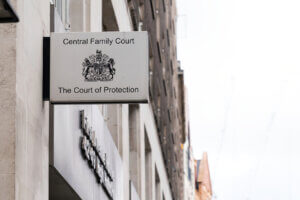Do I Have to Share My Inheritance With My Spouse?

Contact
Table of Contents
Inheritance & Divorce
It is a common myth that assets inherited during a marriage are ring fenced in divorce proceedings because they originate from one spouse’s family or loved ones. In reality, inherited assets such as money and property don’t just get a free pass.
In the UK, inheritances are generally considered non-matrimonial property. This means they are not automatically included in the division of marital assets. However, if the inheritance was mingled with marital assets or used for the benefit of the family (e.g., to purchase a family home), it may be considered part of the marital assets.
The family court will look at your situation holistically to arrive at a fair financial settlement. The court has wide discretion to redistribute all the couple’s assets in a way that it deems fair—and that can include inherited assets.
Is my spouse entitled to my inheritance when we get divorced?
Anything one partner inherits may be included as part of the in a divorce. This may seem unfair. After all, only one of the partners received the inheritance, and they may have received it before the marriage took place.
The law recognises this and starts from a position where inheritances are not automatically included in the pot of assets to be split between you when you go your separate ways. However, depending on your circumstances, they can be taken into account.
When will the court share an inheritance?
In divorce proceedings, assets are either:
-
Matrimonial assets – assets that the couple has accrued together during the course of their marriage (e.g. shared savings, property). Matrimonial assets automatically go into the pot of assets to be divided.
-
Non-matrimonial assets – assets that one individual partner owned before the marriage or which came from an outside source during the marriage, like an inheritance. Non-matrimonial assets do not automatically go into the matrimonial pot.
In many cases, you will be able to keep non-matrimonial assets out of the financial settlement you and your ex agree to, or from a financial order the court makes. But if the matrimonial assets are not enough to meet the reasonable needs of both parties, then the court can take non-matrimonial assets into account as well.
If this happens, then the spouse can benefit from the inheritance money.
Will the inheritance be split 50-50?
“Reasonable needs” is a flexible concept. Under the Matrimonial Causes Act 1973, the court has wide discretion to redistribute assets in a way that it deems fair, which may or may not involve a 50-50 split of the inheritance.
The court will look at various factors when deciding an appropriate split, or whether the inheritance should be shared at all. This includes such things as the couple’s standard of living during the marriage, each person’s age, health and income, and the needs of any children from the marriage, which take priority.
What other factors will the court take into account?
The court will also take other factors into account when deciding whether an inheritance should change from a non-matrimonial to a matrimonial asset. These include:
-
The value of the inheritance
-
When it was received
-
How long you have been married
-
Whether you mingled the inheritance with shared money in the past.
For example, if you placed the inheritance money in a joint account and spent it on family expenses, the court may decide that you intended for it to be shared and place it into the matrimonial pot to be split between you and your ex.
The case of Y v Y – needs trump all
The case of Y v Y is a good example of how these concepts fit together. Here, the court confirmed that:
-
The needs of the parties will always outweigh any right to ring-fence inherited assets as non-matrimonial, and
-
The court can invade an inheritance if it’s “fair and justified” to meet the other party’s reasonable needs.
In Y v Y, the parties were married for 26 years and had five children, some of whom were still school age. The couple enjoyed an exceptionally high standard of living through the marriage. The lion’s share of the wealth came from a large country estate that the husband had inherited from his family.
The wife sought a lump sum of £11.2 million in order to rehouse and set up an investment fund. The husband offered £7 million of which £3.5 million he suggested be used to re-house.
Ultimately, the wife was awarded £8.74 million, which was 32.5% of the inherited assets. The court confirmed that it will look at each family’s unique situation when deciding how to divide assets on divorce. In this case, the court deemed it fair and justifiable to include one-third of the inheritance in the Financial Remedy Order.
Is future inheritance considered in a divorce settlement?
Inheritance that you expect to receive in the future, for example from a parent who is still alive, is not usually taken into account.
However, if you finalise the divorce without putting a financial consent order in place, then your ex-spouse may be able to make a claim against that inheritance if it comes through in the future. The only way to avoid this is to make sure you have a legally binding financial settlement in place before the Final Order is issued in your divorce.
In some countries, there is an automatic right to inherit. If this is the case in your situation, the inheritance may be seen as an asset already belonging to you and therefore considered part of the assets to be divided on divorce.
Our expertise in international divorces means we are used to situations like this and can advise you on the best way forward.
-
Related article: The Benefits of Early Inheritance Tax Planning
Can you protect an inheritance from your spouse?
Often, one partner who received an inheritance may want to ensure the money is passed to their children and not to their ex. Do they have to share the inheritance?
It can be possible to ring-fence an inheritance in some circumstances. For example, you might consider:
-
Ensure the inherited asset is kept separate from matrimonial assets and not mingled with shared money during the marriage
-
Place the inheritance in a trust for the benefit of the children.
Each of these options needs planning and legal advice to be effective. Waiting until a divorce is imminent may limit your options for protecting inherited wealth and the best advice is to take professional guidance as soon as possible after the inheritance has been received, or even before it is received.
How can we help protect an inheritance in divorce?
Divorce and inheritance issues can be challenging to navigate, especially when they intersect. At Osbornes, we have teams of experienced divorce lawyers and private wealth lawyers who work together to ensure the best possible outcome, particularly in regards to resolving financial matters in divorce.
We offer a free confidential consultation to anyone who needs advice. Speak to one of our specialist family solicitors on 020 7485 8811 or fill in the contact form.
Further reading:
Share this article
Frequently Asked Questions
Is a spouse entitled to inheritance property?
Inherited property is not always ring fenced from the assets to be distributed in a divorce. It may be subject to division if it has been mingled with shared money during the marriage, or if it needs to be shared to meet each party’s reasonable financial needs.
Do I have to disclose my inheritance?
You will have to disclose your inheritance on Form E. That doesn’t mean the inheritance will be shared – if the matrimonial assets are enough to meet everyone’s needs fairly, then the inheritance may remain with the recipient.
However, failure to disclose can land you legal trouble. It will usually result in the financial order the court makes being set aside.
Can a prenuptial agreement protect my inheritance?
Yes, a prenuptial agreement can specify that any future inheritance remains separate property, not subject to division in a divorce.
Prenuptial agreements are not automatically binding in the UK, but they are taken into account by the court and can be upheld if certain conditions are met.
What happens if my spouse and I used my inheritance to purchase our family home?
If inheritance funds are used for marital purposes, such as purchasing a family home, it may be considered intermingled with marital assets and potentially subject to division upon divorce.
Can my ex-husband or wife claim my inheritance from my parents?
In some cases, yes they can. To prevent an ex-spouse from claiming your inheritance from your parents we recommend taking out a consent order. A consent order is a legal document that confirms the financial settlement that the you come to when you separate regarding assets like pensions, property, savings, investments and future inheritances.
What happens to inheritance if you are separated but not divorced?
This depends on whether you have legally separated or not.
If you are living apart but have not taken the steps to formalise your separation, your partner may still have a claim on your inheritance in any future divorce proceedings.
If you are legally separated rather than divorced that is formalised with a separation agreement, this will help to clarify the financial arrangements between you and your partner and will help to protect an inheritance from claims by your partner.
Is inheritance a marital asset?
As mentioned about In relation to what the courts consider in divorce proceedings, assets are either:
- Matrimonial (marital) assets – assets that the couple has accrued together during the course of their marriage (e.g. shared savings, the family home). Matrimonial assets automatically go into the pot of assets to be divided.
- Non-matrimonial (non-marital) assets – these are assets that one partner owned before the marriage or which came from an outside source during the marriage, like an inheritance. Non-matrimonial assets do not automatically go into the matrimonial pot.
Can I cut my husband/wife out of my will?
If you are still married you have the right to cut your spouse out of your will but they may still be able to claim against your estate when you die. If your spouse was financially dependent on you, they can challenge your will and claim reasonable financial provision from your estate.
- If you divorce, your ex-spouse is automatically removed from your will. However, until your divorce is finalised, your assets may pass to your spouse.
- If you are separated but not divorced, your spouse is still legally entitled to claim from your estate.
Speak to us about Inheritance & Divorce
Call us 020 7485 8811
Email us Send us an email and we’ll get back to you
Lisa is a robust and caring mediator. She strives to help the parties reach an outcome that they are both happy with.
Lisa is hard-working, knowledgeable, efficient and bang up to date with the law.
Lisa is realistic in her advice, which clients need in the moment of uncertainty. Clients trust her and her advice.
Lisa is an exceptional mediator and lawyer. She has impressive insight and is down to earth, giving pragmatic and clear advice.
Lisa Pepper is particularly recognised for her role as a mediator in complex cross-border disputes. Her practice also includes handling prenuptial agreements and issues arising from divorces. She is additionally skilled in Schedule 1 and other child arrangement matters.
"She's an extremely supportive and kind lawyer. She has an increasing mediation profile too. I can't think of anyone who would handle a mediation better than Lisa."
"Lisa is extremely hard-working and adored by her clients. She is a very empathetic and approachable lawyer."
"I have a huge amount of respect for the way she approaches legal issues; she is really knowledgeable, approachable and always works hard to help a client find an amicable solution."
"She has a real drive to push things forward to a solution, which means she can handle the more difficult cases."
I can’t think of anyone who would handle a mediation better than Lisa.
Lisa Pepper is extremely hard-working and adored by her clients. She is a very empathetic and approachable lawyer.
She’s an extremely supportive and kind lawyer and has an increasing mediation profile too
The Osbornes mediation team is excellent and has some good individuals.
Osbornes fields a sizeable team with many standout lawyers.
Insights about Divorce Financial SettlementsVIEW ALL
- 11.6.2025
Property Value Drop Won’t Change Financial Order
Drop in matrimonial home value is not enough to overturn a financial order, says Court The financial remedies team at...
Read more - 1.5.2025
Foreign Courts: Putting Non-UK Assets Out of Reach
Financial Remedies: could a party use a foreign court to put non-UK assets out of reach? The financial remedies team...
Read more - 11.4.2025
Evidencing Company Valuations in Divorce Cases
The importance of evidencing calculations of company values The financial remedies team at Osbornes Law represents clients where significant investment...
Read more - 1.4.2025
Company Valuations & Deferred Consideration
Company Valuations And The Status of Deferred Consideration Following from my previous blog I wanted to discuss the very important...
Read more - 17.3.2025
Selling a House in Divorce
A guide to amicably selling a house during divorce One of the biggest issues in divorce is what happens to...
Read more - 24.2.2025
How Are Finances Divided On Divorce?
Avoiding Misconceptions: How Are Finances Divided On Divorce? The financial remedies team at Osbornes Law advises divorcing clients across London...
Read more - 21.2.2025
Protecting Business Privacy in Divorce Financial Proceedings
Business owners: protecting privacy of confidential information in financial proceedings on divorce We represent many business-owners in financial proceedings on...
Read more - 27.1.2025
Financial Remedies: Company Valuation in Divorce Cases
Financial Remedies: The Company Valuation Challenge The tricky matter of business valuations often arises in the course of financial proceedings...
Read more - 4.11.2024
Anglo-French Divorce: Jurisdiction Guide
Anglo-French Divorce: which jurisdiction is right for you? It has been a year since we launched our Anglo-French department in...
Read more - 29.10.2024
Economic Disadvantage in Divorce: Can You Be Compensated?
Giving Up High Earnings: Can A Party Be Compensated For Economic Disadvantage? In financial remedies cases, the fact that one...
Read more - 24.10.2024
Can a Declaration of Trust Stand in Matrimonial...
Matrimonial Homes: Can A Declaration Of Trust Of Beneficial Ownership Stand? Resolving issues relating to ownership of the former matrimonial...
Read more - 23.10.2024
When Abusive Behaviour Affects Divorce Financial Relief
When is Abusive Behaviour Relevant To Financial Relief on Divorce? Domestic violence and other abusive behaviours are a contributing factor...
Read more - 25.9.2024
What Happens to Savings & Investments in Divorce?
Divorce often raises important questions about the division of assets, particularly savings and investments. Understanding what happens to these financial...
Read more - 23.9.2024
International footballer fails to comply with financial disclosure
UD v TQ: The importance of complying with financial disclosure Recent divorce case involving an unnamed international footballer is a...
Read more - 20.9.2024
Pension Attachment Order: A guide
Pensions are quite often valuable assets in a marriage. In some cases, they can be worth more than the family...
Read more - 11.9.2024
Financial relief after overseas divorce: a case study...
Can I claim financial relief after an overseas divorce? Obtaining a divorce in Algeria did not prevent a wife from...
Read more - 27.8.2024
Pension Sharing Orders
Pension Sharing in Divorce With so many things to consider when dividing up your finances during a divorce or dissolution...
Read more - 20.8.2024
What is pension offsetting?
In this article, we will explore the concept of pension offsetting and how it can play a crucial role in...
Read more - 12.8.2024
NA v LA [2024] EWFC 113: Judge Orders Non-Court Dispute...
Financial Claims: Judges Can Order Parties To Attempt Non-Court Dispute Resolution As was expected, the court has been quick to...
Read more - 1.8.2024
Standish v Standish: Court of Appeal Decision on...
Court of Appeal reduces wife’s divorce award by £20million Dealing with financial matters on divorce can be complex. And...
Read more - 1.8.2024
Matrimonial vs Non-Matrimonial Assets
Matrimonial vs Non-Matrimonial Assets in Divorce During a divorce, people often make the mistake of assuming that everything they own...
Read more - 1.8.2024
What is a Periodical Payments Order?
Periodical Payments Orders in Divorce Throughout the process of a divorce or when unmarried couples with children split up, numerous...
Read more - 1.8.2024
What is a Lump Sum Order?
A lump sum order is a crucial element of divorce settlements that can significantly impact the financial future of both...
Read more - 25.7.2024
What is a Property Adjustment Order?
A property adjustment order is a key legal mechanism used during a divorce to fairly divide property and assets between...
Read more

































